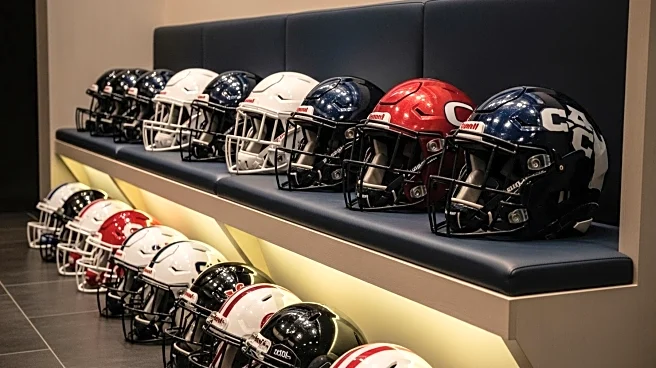What's Happening?
In the 2025 college football season, a notable trend has emerged with four true freshmen quarterbacks starting from Day 1. This marks a significant shift from previous years where freshmen rarely started. The change is influenced by several factors, including the expiration of COVID-19 eligibility extensions and the impact of the transfer portal. The NCAA's rule changes in 2020, allowing extra eligibility and transfer exemptions, have altered roster strategies, encouraging teams to invest in young talent. Notable freshmen include Bryce Underwood at Michigan, Malik Washington at Maryland, Jaron-Keawe Sagapolutele at Cal, and Bear Bachmeier at BYU. These players are part of a strong 2025 class, with schools investing heavily in their development, sometimes influenced by monetary politics.
Why It's Important?
The decision to start true freshmen quarterbacks reflects broader shifts in college football dynamics. With the transfer portal offering experienced players, teams previously hesitated to start young quarterbacks. However, the expiration of COVID-19 eligibility extensions has reduced the pool of veteran players, prompting schools to focus on developing young talent. This trend could impact recruitment strategies, as schools may prioritize securing top high school prospects to ensure long-term success. Additionally, the financial aspect, with schools investing significant resources in these players, highlights the growing influence of monetary politics in college sports.
What's Next?
As the season progresses, the performance of these freshmen quarterbacks will be closely monitored. Their success could reinforce the trend of starting young players, influencing future recruitment and roster strategies. Schools may continue to invest in high-profile recruits, balancing the need for immediate impact with long-term development. The evolving landscape may also prompt discussions on the role of financial incentives in college sports, potentially leading to policy changes or adjustments in how schools manage their athletic programs.
Beyond the Headlines
The trend of starting true freshmen quarterbacks raises questions about the ethical implications of monetary politics in college sports. As schools invest heavily in young players, the pressure to perform can be immense, potentially affecting their development and well-being. Additionally, the focus on immediate success may overshadow the importance of education and personal growth for student-athletes. These considerations could spark debates on the balance between athletics and academics, and the role of financial incentives in shaping college sports.










